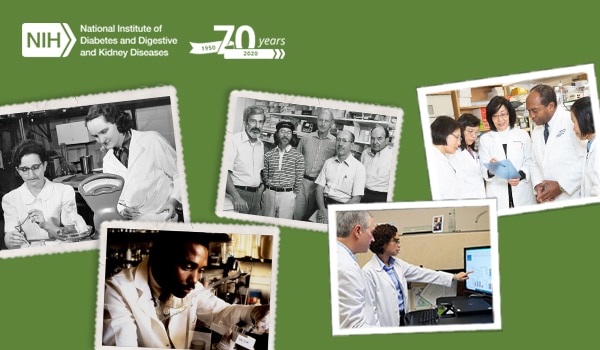Celebrating 70 Years of Advancing Health Through Research

Highlights from NIDDK research that are making a difference today and in the future.
This year marks NIDDK’s 70th anniversary, and over the past 70 years, we have made many strides in research on diabetes and other chronic diseases such as kidney disease. We continue to fund research in these areas and are looking forward to more scientific breakthroughs that will help improve the lives of people who are living with these chronic conditions.
In honor of this milestone, read on to learn about some of our research results and discoveries in diabetes and kidney disease, and visit our 70th anniversary page for more information about our past, present, and future focuses in these areas.
Type 2 Diabetes – Advances in Treatment
With new classes of drugs available for treating adults with type 2 diabetes, including GLP-1 receptor agonists and SGLT2 inhibitors, an NIDDK-funded study is looking at long-term differences in treatments.
The NIDDK-funded Glycemia Reduction Approaches in Diabetes: A Comparative Effectiveness Study seeks to determine which of four commonly used glucose-lowering drugs, when added to metformin, is best for achieving good glycemic control, has the fewest side effects, and provides the most overall health benefits in long-term treatment for people with type 2 diabetes.
Importantly, medications in both classes have been shown to reduce cardiovascular and/or kidney complications of type 2 diabetes, and to promote weight loss, while being less likely than some other type 2 diabetes medications to cause blood glucose levels to become too low.
Type 1 Diabetes – Benefits of Intensive Glucose Control
A landmark NIDDK-supported clinical trial and follow-up study, the Diabetes Control and Complications Trial/Epidemiology of Diabetes Interventions and Complications, showed that early and intensive blood glucose control dramatically delays or prevents the eye, nerve, kidney, and heart complications of type 1 diabetes—making early and intensive blood glucose control the standard treatment worldwide. NIDDK-supported research has also contributed to many new FDA-approved technologies that are giving people new options for managing their disease with more precise, less burdensome methods.
For example, there are continuous glucose monitors (CGM) that provide real-time data of blood glucose levels without the need for finger sticks, improved formulas of insulin and glucagon (a hormone that raises blood glucose levels when an individual has hypoglycemia, or dangerously low blood glucose levels), and hybrid artificial pancreas devices that pair a CGM with an insulin pump to sense blood glucose and adjust insulin dosage automatically. Even with these major advances, managing type 1 diabetes still places a large burden on patients and caregivers.
Gestational Diabetes – Effects of Blood Glucose in Pregnancy
In 2008, the landmark NIH-funded Hyperglycemia and Adverse Pregnancy Outcomes (HAPO) study reported findings of health problems associated with untreated glucose levels during pregnancy that were above normal, but not high enough to be considered diabetes by traditional criteria in 23,000 racially and ethnically diverse pregnant women and their babies. These health problems included increased risk of multiple adverse delivery and neonatal outcomes for the mother and child.
Results from the NIDDK-led HAPO Follow Up Study have demonstrated long-term metabolic impacts of hyperglycemia during pregnancy at levels lower than overt diabetes on both mothers and offspring, including greatly increased risk of later type 2 diabetes diagnosis in mothers, increased risk of obesity in children, and higher blood glucose levels in children when evaluated 10 to 14 years later.
Kidney Diseases – Identifying Genetic Markers
Because kidney disease often runs in families, the NIH has carried out several genetic studies of kidney disease. Researchers are learning how to identify genetic markers that might predict who will get kidney damage, especially in African Americans. Variants in the APOL1 gene have been shown to account for much of the 2- to 4-fold increase in kidney failure in African Americans compared to whites. To build on this knowledge, the NIDDK, NIMHD, and NIAID launched the APOL1 Long-term Kidney Transplantation Outcomes Network (APOLLO) study, which is comprehensively assessing the effects of APOL1 variants on the risk of kidney transplant failure across all the transplant centers in the U.S. APOLLO is also studying the impact of APOL1 variants on the health of living kidney donors.


Comments